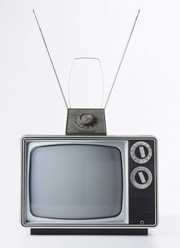Television
Television (also, informally, "TV" and "telly") is the electronic transmission of moving pictures. The word "television" literally means "far sight"; it was formed by combining the Greek word τῆλε ("tele", or "far") with the Latin word visio-n ("sight", from video, vis- to see) — this coinage follows the pattern of telegraph ("far writer") and telephone ("far talker"). A parallel constuction may be found in German, where it is known as "fernsehen" or "far-seer." In general usage, the meaning of "television" has been expanded to also refer to receivers, and to video in conventional broadcast as well as cable and satellite signals.The word is also used to describe, in broad terms, the content of television programming generally.
Emergence of television as a mass medium
Content of television programming
In its earliest days, there was a good deal of incertainty as to what exactly what sort of material was suitable for broadcasts. The BBC's earliest broadcasts using the Baird system tended to focus on music-hall performers, singers, and novelty acts. A typical daily program, from December 4th 1930, included the folowing:
- Bernard Dudley - character vocalist
- Pauline & Diana - instrumental entertainment
- Keith Mason - and his ukelele
- Eric Mason - entertainer and conjurer
- Gaye Jukes - musical comedy artists
- "Coal comfort" - a sketch by L. Saxey
- Jack Royce - coon songs
